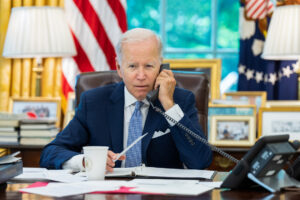Despite Xi’s ‘fire,’ call with Biden avoided Taiwan escalation

WASHINGTON — US President Joseph R. Biden, Jr., and Chinese President Xi Jinping managed largely to steer clear of escalatory rhetoric on Taiwan in a Thursday call, suggesting that neither side — preoccupied with economic woes at home — wants a fresh crisis across the Taiwan Strait.
Mr. Xi’s warning to Mr. Biden against “playing with fire” over Taiwan, though vivid, largely mirrored his remarks from the two leaders’ video meeting in November.
“The portion of the conversation on Taiwan was extremely similar to the last conversation. Xi’s warnings did not escalate,” said Bonnie Glaser, a China expert at the German Marshall Fund of the United States, referring to Beijing’s readout of the call.
Taiwan comprised one of three parts of the more than two-hour discussion, according to a senior US official who briefed reporters. The others largely focused on Russia’s war in Ukraine and areas of possible US-China cooperation, such as climate change.
The official declined to say if Messrs. Biden and Xi directly broached the topic of House Speaker Nancy Pelosi’s yet-to-be-confirmed visit to the island, instead highlighting that Mr. Biden had conveyed that Washington maintained its long-standing “one-China policy” under which it recognizes Beijing, not Taipei, diplomatically.
“My sense is the two leaders talking directly probably lowered the temperature somewhat relative to what it would have been without the meeting,” said Jacob Stokes, an Indo-Pacific security fellow at the Center for a New American Security.
“But the structural drivers of tension in the bilateral relationship remain, as does the prospect of a visit by Speaker Pelosi to Taiwan,” he said.
Beijing has issued escalating warnings about repercussions should Pelosi visit Taiwan, which says it is facing increasing Chinese military and economic threats.
Ms. Pelosi, a Democrat like Mr. Biden, is a long-time critic of Beijing, particularly on human rights.
A visit by the House speaker, as soon as August according to some reports, would be a dramatic, though not unprecedented, show of US support for the island. Republican Newt Gingrich was the last House speaker to visit Taiwan in 1997.
Some experts worry such a move at a time of fraught ties could spur a major crisis and even unintended clashes.
But others have downplayed the idea that China and the United States are on the cusp of calamity over Taiwan.
“There are nightmare fantasies out there. Maybe they’ll shoot down Speaker Pelosi’s plane. Maybe they’ll invade the island while she’s there. For crying out loud, we’re not in a Tom Clancy novel,” said Dean Cheng, a China expert at the conservative Heritage Foundation.
Mr. Cheng said China was more likely to increase military flights over the median line dividing the more than 100-mile (160-km) wide Taiwan Strait that separates China from Taiwan, or circumnavigate the island to send a message about the reach of its forces.
China has grown far more powerful militarily and economically since 1997 and the White House says the administration has been in touch with Ms. Pelosi’s office to make sure she has “all the context” she needs to make decisions about her travel.
Craig Singleton, senior fellow at the Washington-based Foundation for Defense of Democracies’ China Program, said in a note to media that as Washington and Beijing confront serious economic headwinds, both Messrs. Biden and Xi will face intensifying domestic pressure to stabilize the bilateral relationship.
“So far, there are few indications in Chinese official statements, nor online or domestic media, which would suggest that China is considering more serious military action at this time, although that could change,” he said. — Michael Martina and David Brunnstrom/Reuters




